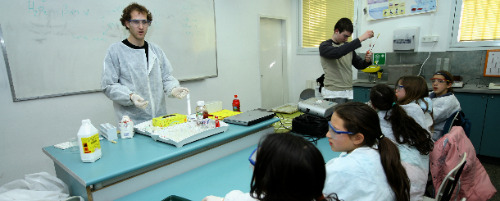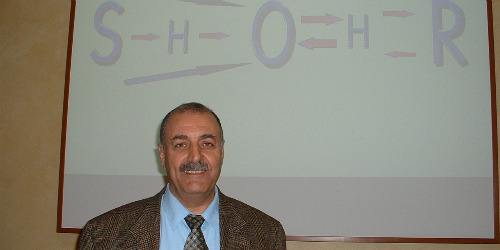Israeli researchers find girls can be trained to narrow the gender gap separating them from boys in the realm of spatial abilities, holding out hope of better grades in science, math and engineering.

An educational intervention devised by Israeli researchers can successfully bridge a hard-wired ‘gender gap’ in spatial abilities between boys and girls.
“Boys are better than girls in spatial abilities and especially in the domain of mental rotation, the ability to rotate some visual aspect in your mind and visualize how it will look when rotated,” says Dr. David Tzuriel, professor of psychology and education at Bar-Ilan University.
“Mental rotation has been found to be related to many skills in which males perform better than females,” he tells ISRAEL21c. “That’s why there are so many males in exact sciences like architecture, physics and chemistry, theoretically because they require these spatial abilities.”
Differences in the brains of boys and girls are evident even in infancy. By preschool, boys demonstrate a superior ability to perform tasks involving mental rotation, says Tzuriel, a clinical and educational psychologist and a worldwide expert on dynamic assessment of learning potential, adding “We really wanted to see whether it is possible to close this gender gap.”
Girls learned skills and closed the gap
Tzuriel and doctoral student Gila Egozi determined from preliminary studies that females find it difficult to gain control over spatial tasks, especially those involving mental rotation. They apparently are genetically programmed to consider details in what Tzuriel terms a “local’ way, while males have a more “global” perspective. This may contribute to the general perception that males are better drivers.
“But that doesn’t mean it’s not possible for females to develop their skills and become equal to males in a particular domain,” stresses 64-year-old Tzuriel, the father of five girls and one boy. “What is needed is a way to look at information in a holistic way rather than details. That makes it easier to control the data and manipulate the visual stimuli.”
Tzuriel and Egozi then conducted an interventional study on more than 100 randomly selected Israeli first-grade boys and girls. They based their approach on a theory of cognitive modifiability that Tzuriel learned early in his career as an assistant to Israel Prize-winning developmental psychologist Prof. Reuven Feuerstein at Jerusalem’s International Center for the Enhancement of Learning Potential.
The results of their study are described in the current issue of Child Development.
About half of the first-graders received training to perceive spatial information holistically rather than focusing on particular details, and to think about spatial geometric pictures from different points of view. The other children formed a control group that learned a non-holistic way of grasping information.

“When tested before and after, we found that the girls in the experimental group who had started at a lower level had closed the gap afterwards,” Tzuriel reports. “At the end of the program they performed as well as the boys, meaning they made more progress than the boys did.”
An attribute considered genetic can be modified
Surprisingly, the spatial abilities of the girls in the experimental group were ultimately superior to those of the boys in the control group.
While the research doesn’t yet show that holistic training leads to better achievement in science, math and engineering for girls, it is a promising first step.
“This demonstrates that an attribute considered to be genetic can be modified,” Tzuriel maintains. “People with children having any sort of difficulty that might be related to inherited attributes should know that this is not the end of the road. It is possible to improve through cognitive intervention.”
The researchers didn’t ponder the reason why boys and girls are born with differing strengths. “We don’t know the reason,” Tzuriel replies. “But just because there are differences doesn’t mean the differences are fixed. They can be modified because the brain is very plastic. In realms where boys are inferior to girls, that can be modified as well. How you approach it depends on the domain you want to develop.”
Ensuring equal access for girls and boys
Tzuriel is editor of the Journal of Cognitive Education and Psychology and is a full professor at Bar-Ilan, where he formerly chaired the School of Education.
He is regarded as a world leader in the field of dynamic assessment of learning potential, used widely in England, Italy, the Netherlands, Belgium and North America. He has taught 150 international workshops, some under the auspices of the American Psychological Association and also UNICEF in South America.
“I am interested in seeing how a child develops, thinks and changes. Based on the results, we can figure out what kind of intervention will be needed to maximize the potential of the child,” he explains. “We are not trying to force something against a child’s nature, but ensure equal access. Very often this helps children with learning disabilities to a better life.”
Tzuriel hopes his research will lead to widespread training programs like the one used in his study. “Maybe in the future this could be generalized to math, physics, chemistry and architecture. Those who participate would benefit not only in specific tasks but in other school content as well.”













